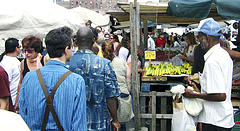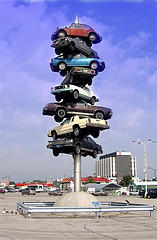 On Fridays I usually go shopping downtown in Boston where we have one of the very few remaining vegtable markets. That shouldn’t be confused with farmers market, the stalls at Haymarket are run by people who’s only goal is to sell you vegtables; cheap, fast, and often crummy. It’s aggressively competitive down there.
On Fridays I usually go shopping downtown in Boston where we have one of the very few remaining vegtable markets. That shouldn’t be confused with farmers market, the stalls at Haymarket are run by people who’s only goal is to sell you vegtables; cheap, fast, and often crummy. It’s aggressively competitive down there.
My house is a first ring suburb. Such suburbs were made possibly by the steam train late in the 19th century. Since steam trains took a while to get up to speed and a while to bring to a stop these suburbs where, originally, surrounded by farms. The farms were driven out, progressivly, by the street car and then the automobile.
It’s a 15 mile drive from my house to Haymarket, or about $4.00 in gas round trip at current prices. It costs me another dollar to park at Haymarket, since there’s a deal. I easily save that much by buying my vegtables, sausage, cheese, etc. inside the competitive market. (Notice that rising gas prices should allow Walmart to raise prices. )
But I mostly do it because I love the dense, crowded, diverse, urban experiance. I like buying my sausage at the butcher with a cat. I like buying my pita bread from the eight year old son of the halal butcher who’s shop is in a basement. I like buying my green pepers from the amazingly old Italian lady, who unlike other vendors tends to sell only 2 or three things each week. And I always enjoy watching the tourists.
 I’m a huge fan of cities. I really dislike the American enthusiasm for the rural. I agree with Steven Johnson’s comment: “I think the long tail premise has a tacit anti-urban bias to it, since it used to require big city scale to find obscure long tail books or albums that are now readily available to anyone with an Internet connection.” I’d go further and argue that all the vast majority of the happy long tail stories involve the emergence of a commercial entity that substitutes for an urban or civic institution; but the story tellers are carefully to remain blind to the risk that such private entities abuse the power that results.
I’m a huge fan of cities. I really dislike the American enthusiasm for the rural. I agree with Steven Johnson’s comment: “I think the long tail premise has a tacit anti-urban bias to it, since it used to require big city scale to find obscure long tail books or albums that are now readily available to anyone with an Internet connection.” I’d go further and argue that all the vast majority of the happy long tail stories involve the emergence of a commercial entity that substitutes for an urban or civic institution; but the story tellers are carefully to remain blind to the risk that such private entities abuse the power that results.
Is the Internet good or bad for cities? Now there’s a question that merits some further work! I think it’s clear that cars, for example, were very bad for cities. Is the Internet better or worse than cars?
For example I find it facinating how the Internet can be a huge help in finding information about vendors and services in low density areas but if you look for similar information in the Bronx, Brooklyn, or down town Boston you find hardly anything. My hypothisis about that has been that vendors seek ways to connect with their customers and that if your issolated then the Internet provides a welcome way to create connections; but if your embedded in a dense urban area then the Internet is only yet another way to create connections.
 Steve has a short article in Discover magazine that takes a look at this question. He talks a bit about how cities enable people to rondevous. So like my hypothisis it’s about connections. But he talks about things that benefit from physical connections. And he talks about how we might be able to build Internet systems, ala meet-up or dodge-ball, which have are synergistic with the city. What I found neat in the essay was the thought that there may well be a class of systems waiting to be built that strengthen and leverage urban density; systems that have little if any value for rural and suburban densities.
Steve has a short article in Discover magazine that takes a look at this question. He talks a bit about how cities enable people to rondevous. So like my hypothisis it’s about connections. But he talks about things that benefit from physical connections. And he talks about how we might be able to build Internet systems, ala meet-up or dodge-ball, which have are synergistic with the city. What I found neat in the essay was the thought that there may well be a class of systems waiting to be built that strengthen and leverage urban density; systems that have little if any value for rural and suburban densities.
If such systems exist it would be a strong argument that the net can be good for cities.
Meanwhile the real mystery is what in the world was the guy in the suit buying six pounds of ginger root for?
Pingback: Ascription is an Anathema to any Enthusiasm » Blog Archive » Trip to the Market